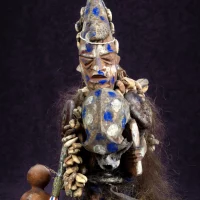Abeguwo : Goddess of Rain
Listen
At a glance
| Description | |
|---|---|
| Origin | Papuan Mythology |
| Classification | Gods |
| Family Members | N/A |
| Region | Melenesia, Papua New Guniea |
| Associated With | Rain |
Abeguwo
Introduction
Abeguwo is a revered goddess in Melanesian and Papuan mythology, worshipped by indigenous communities across the vast region encompassing Melanesia, including the island of New Guinea and its surroundings. She represents the life-giving rain and symbolizes the vital connection between the heavens and the earth within the rich tapestry of Melanesian mythology.
Physical Traits
Abeguwo’s residence in the sky underscores her divine and ethereal nature within Melanesian and Papuan mythology. While specific physical descriptions of her are lacking, she is often envisioned as a celestial being. Rather than focusing on her appearance, worshippers emphasize her role as the bringer of life-sustaining rain. Some interpretations portray Abeguwo as a nurturing mother figure, embodying abundance with her body overflowing with water—a powerful symbol of sustenance for the land.
Family
The Papuan culture boasts a diverse and complex mythology, with each of its 240 distinct peoples possessing unique languages and traditions. While specific familial ties of Abeguwo remain unmentioned in available resources, she likely occupies a role within a broader pantheon of revered deities in the region. The exact placement of Abeguwo within this pantheon remains undefined. Melanesian mythologies exhibit a rich diversity, varying across regions and tribes. While Abeguwo is associated with rain, other deities govern different aspects such as agriculture, fertility, or the natural world. Speculation suggests that Abeguwo may be connected to weather gods or creator deities in specific regional traditions, though the absence of concrete evidence leaves room for interpretation in her narrative.
Other names
Abeguwo’s name is predominantly associated with the western regions of New Guinea within Melanesian and Papuan mythologies. However, due to the diverse array of cultures and languages across this vast region, she may be recognized by different names in other areas. For example, tribes residing in eastern New Guinea could venerate rain deities with unique characteristics and names. Exploring these regional variations could offer valuable insights into the diverse interpretations of rain and its divine representation.
Powers and Abilities
Abeguwo’s primary authority rests in her command over rain, regulating the vital flow of water from the heavens to nurture the land and sustain plants and animals. In regions heavily reliant on agriculture, Abeguwo’s role as the rain giver becomes indispensable. Traditional rituals and offerings were conducted to honor Abeguwo, seeking her benevolence in sending rain to ensure sustenance. These ceremonies served not only as practical measures for survival but also as expressions of gratitude, fostering a harmonious relationship with the divine.
In addition to her mastery over rain, there are interpretations suggesting that Abeguwo possesses broader abilities, potentially influencing fertility, growth, or the overall well-being of the people. However, lacking concrete evidence, these interpretations remain speculative. Abeguwo is revered as the goddess of rain, with beliefs depicting her unique ability to bring rainfall by urinating onto the Earth. This symbolism underscores her intimate connection with the natural world and underscores her significance in regional agricultural practices.
Modern Day Influence
In contemporary times, the influence of Abeguwo and other traditional deities has waned due to the spread of Christianity. Nevertheless, remnants of traditional beliefs persist, often blending with Christian elements in post-Missionary Papua New Guinea. This syncretism ensures that Abeguwo and other traditional deities maintain a significant place in the spiritual lives of the Papuan people, even amidst the dominance of Christianity.
The crucial role of rain in agricultural success and community welfare continues to resonate deeply with indigenous populations. While traditional ceremonies and rituals may occur less frequently, they are still practiced during times of drought, underscoring the enduring bond between humanity and the divine rain giver.
Moreover, the concept of Abeguwo holds contemporary relevance in the context of climate change. As the world grapples with unpredictable weather patterns and water scarcity, Abeguwo’s stories serve as a poignant reminder of the delicate balance between humanity and nature. Her imagery inspires a renewed appreciation for the life-giving power of rain and advocates for responsible environmental stewardship.
In the realms of art and literature, Abeguwo remains a wellspring of inspiration. Artists integrate her likeness into paintings, sculptures, and wood carvings, preserving her narrative for future generations. Writers craft stories infused with Abeguwo’s spirit, emphasizing the significance of rain and the interconnectedness of the natural world. Through these creative expressions, Abeguwo’s legacy endures, fostering a deeper understanding of Papuan mythology and its enduring relevance in modern times.
Related Images
Frequently Asked Questions
What is lorem Ipsum?
I am text block. Click edit button to change this text. Lorem ipsum dolor sit amet, consectetur adipiscing elit. Ut elit tellus, luctus nec ullamcorper mattis, pulvinar dapibus leo.
What is lorem Ipsum?
I am text block. Click edit button to change this text. Lorem ipsum dolor sit amet, consectetur adipiscing elit. Ut elit tellus, luctus nec ullamcorper mattis, pulvinar dapibus leo.
What is lorem Ipsum?
I am text block. Click edit button to change this text. Lorem ipsum dolor sit amet, consectetur adipiscing elit. Ut elit tellus, luctus nec ullamcorper mattis, pulvinar dapibus leo.
What is lorem Ipsum?
I am text block. Click edit button to change this text. Lorem ipsum dolor sit amet, consectetur adipiscing elit. Ut elit tellus, luctus nec ullamcorper mattis, pulvinar dapibus leo.
What is lorem Ipsum?
I am text block. Click edit button to change this text. Lorem ipsum dolor sit amet, consectetur adipiscing elit. Ut elit tellus, luctus nec ullamcorper mattis, pulvinar dapibus leo.








